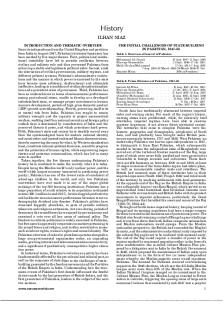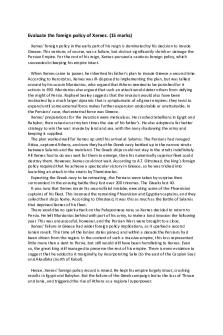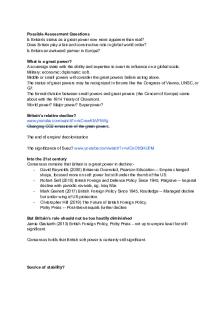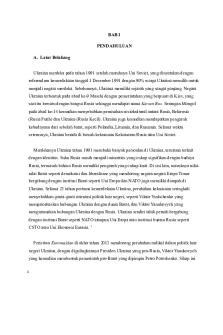Pakistan Foreign Policy 1947 to 2004 PDF

| Title | Pakistan Foreign Policy 1947 to 2004 |
|---|---|
| Author | Laiba Muhammad |
| Course | social work |
| Institution | Lahore College for Women University |
| Pages | 30 |
| File Size | 2.7 MB |
| File Type | |
| Total Downloads | 331 |
| Total Views | 763 |
Summary
1111####### APRIL 2004Pakistan’sForeign Policy:An Overview1947-Pakistan’sForeign Policy:An Overview1947 - 20041111####### APRIL 2004Pakistan’sForeign Policy:An Overview1947-Pakistan’sForeign Policy:An Overview1947 - 2004CONTENTSCONTENTSAbbreviations and Acronyms Foreword Profile of the AuthorIntrodu...
Description
11
APRIL 2004
P akistan’s akistan’s Pakistan’s F oreign P olicy: Foreign Policy: olicy: An Overview 1947-2004
11
APRIL 2004
akistan’s Pakistan’s P akistan’s Foreign Policy: F oreign P olicy: olicy: An Overview 1947-2004
Pakistan’s Foreign Policy: An Overview 1947-2004
CONTENTS Abbreviations and Acronyms Foreword Profile of the Author Introduction Major Phases of Pakistan's Foreign Policy
09 10
a. 1947-53: Exploration and Friendship with All
10
- Foundations of the Foreign Policy - Relations with India - Relations with Afghanistan - Security Imperatives - Relations with U.S.A. and U.S.S.R. - Relations with Muslim Countries b. 1953-62: Alignment with the West - Alignment with the West - Mutual Defence Assistance Agreement - SEATO - The Baghdad Pact / CENTO - Defence and Economic Assistance from the U.S. - Cost of Alignment with the West - Relations with China c. 1962-71: Transition - Rethinking about the Alignment Policy - Improving Relations with the Soviet Union - Improving Relations with China - Diminishing Ties with the U.S. - Pluralistic Perspective - Relations with India - Crisis in East Pakistan and International Response
10 10 10 11 11 11 12 12 12 12 12 13 13 13 14 14 14 14 15 15 16 16
Pakistan’s Foreign Policy: An Overview 1947-2004
CONTENTS d. 1972-79: Bilateralism and Nonalignment - Pak-India Relations: towards improvement - Strengthening of Ties with Major Powers - Nuclear Technology and Relations with the U.S. - Pakistan and the Muslim World e. 1980-90: Afghanistan and Partnership with the United States - Soviet Invasion of Afghanistan - Revival of Pakistan-U.S. Relations - Pakistan-China Relations - Pakistan and the OIC - Pakistan-India: a policy of Dialogues - The Geneva Accords on Afghanistan - Post-withdrawal Problems f. 1990-2001: Post Cold War Era and Pakistan's Dilemmas - Another Drift in Pak-US Relations - Continuation of the Afghanistan Problem - Insurgency in Kashmir - Going Nuclear g. 2001 Onwards: Counter Terrorism - September 11 and Fight Against Terrorism - Increased U.S. Support - Détente with India - Pakistan's Relations with China and Russia - Muslim World and Pakistan - Transfer of Nuclear Technology Concluding Observations Select Bibliography
17 17 17 18 18 19 19 19 19 19 19 20 20 21 21 21 22 22 24 24 24 25 26 26 26 27 28
Pakistan’s Foreign Policy: An Overview 1947-2004
Abbreviations and Acronyms Centcom CENTO CIA ISI NAM OIC POWs SEATO TIFA U.S.A U.S.S.R UK UN USMAAG
Central Command (U.S.) Central Treaty Organisation Central Intelligence Agency (U.S.) Inter Services Intelligence Non Aligned Movement Organisation of the Islamic Conference Prisoners of War South East Asia Treaty Organisation Trade and Investment Framework Agreement United States of America Union of Socialist Soviet Republics United Kingdom United Nations U.S. Military Assistance Advisory Group
Pakistan’s Foreign Policy: An Overview 1947-2004
P
akistan's Foreign Policy: an Overview, a briefing paper by PILDAT, is a special presentation in the context of the PILDAT Short Course for Parliamentarians and Politicians on The Foreign Policy Process in Pakistan. Developed by PILDAT, as a part of the Pakistan Legislative Strengthening Consortium - PLSC, supported financially by the USAID, the paper looks at the major foreign policy phases and development of perspectives in the foreign policy of Pakistan. The paper has been especially commissioned by PILDAT to provide a comprehensive overview of Pakistan's foreign policy from 1947-2004. The briefing paper, essentially prepared for parliamentarians, can also serve as a stand-alone reference document on the foreign policy of Pakistan to-date. Authored by the renowned defence and political analyst, Prof. Dr. Hasan-Askari Rizvi, the paper attempts to present an objective and factual commentary, covering accurate history and shaping of foreign policy perspectives. PILDAT strongly feels that foreign policy should be reviewed and influenced by the supreme policy-making institution of the country: Parliament. It is in this perspective that PILDAT bids to provide an objective and comprehensive overview of the Pakistani foreign policy since independence so as to orient parliamentarians towards the dynamics, actors and influencing factors on foreign policy. This briefing paper is a part of the series of the papers and studies PILDAT has compiled on the subject of foreign policy. Another briefing paper covers the spectrum of the process of foreign policy formulation in Pakistan; a previous briefing paper examines the issue of Pakistan-India Relationship in detail, while three separate case studies examine the formulation of Pakistan's Foreign Policy with special reference to Gulf Crisis-1990; Comparison among Lahore, Agra and Islamabad Summits and the Recognition of Taliban by Pakistan. PILDAT hopes that these papers and the studies, both individually and collectively, serve the purpose of raising awareness of parliamentarians on the dynamics of foreign policy in Pakistan as well as build their capacity to take a pro-active role in formulation, review, analysis and influencing of foreign policy of Pakistan. The author, PILDAT and its team of researchers have made every effort to ensure the accuracy of the contents of this paper. PILDAT, however, does not accept any responsibility of any omission or error as it is not deliberate. The views expressed in this paper belong to the author and are not necessarily shared by PILDAT, PLSC or USAID.
Lahore April 2004
Pakistan’s Foreign Policy: An Overview 1947-2004
PROFILE OFAUTHOR THE AUTHOR PROFILE OF THE Prof. Dr. Hasan-Askari Rizvi is an independent Defence and Political Consultant based in Lahore. Prof. Dr. Hasan Askari holds M.A. and Ph.D in Political Science/International Relations from the University of Pennsylvania, U.SA and M.Phil in Politics from the University of Leeds, UK. He was Quaid-e-Azam Professor of Pakistan Studies at Columbia University, New York (December 1995-July 1999), and Allama Iqbal Professor at South Asia Institute, Heidelberg University, Germany (February 1998-January 1991), and Research Scholar at University of New Mexico and Sandia National Laboratories, Albuquerque (2002). He was also on the Faculty of Political Science, Punjab University, Lahore, including Professor and Chairman Department of Political Science. He is a widely published scholar with over 60 research papers, monographs and chapters in edited volumes published in the U.S., the U.K, Germany, Holland, Nepal and Pakistan. He is a regular contributor of political commentaries to the national dailies of Pakistan. His books include Military, State and Society in Pakistan (New York:St. Martin's Press, 2000), Pakistan and the Geostrategic Environment (London: Macmillan, 1993), The Military and Politics in Pakistan (Lahore: 1976,1986, 2000), and Internal Strife and External Intervention (Lahore: 1981). Prof. Dr. Hasan-Askari Rizvi also serves on the Board of Advisors of PILDAT.
Pakistan’s Foreign Policy: An Overview 1947-2004
INTRODUCTION INTRODUCTION
P
akistan is a major participant in the global efforts to curb transnational terrorism initiated after the terrorist attacks in the United States in September 2001. This enhanced Pakistan's strategic relevance for the major powers, especially the United States, which cultivated Pakistan for combating terrorism and ensuring peace and stability in the post-Taliban Afghanistan. They also wanted that the Taliban and Al-Qaeda activists, formerly based in Afghanistan, did not create safe havens in Pakistani territory with the support of their Pakistani sympathisers. Pakistan has not always been so relevant to global politics. Its strategic relevance has varied over time which had implications for Pakistan's role at the international level and the foreign policy options available to its policy makers. This briefing paper examines the changing patterns of Pakistan's foreign policy and how its position and role in international and regional politics has varied over time. Pakistan recognises that it is neither possible nor advisable to stay in isolation in the present day interdependent and complex international system. It needs to interact with other states, international and regional organisations and supranational actors in order to protect and promote its national interests and sovereign identity. Pakistan also collaborates with other states in order to cope with the issues of global dimensions like environment, population, poverty and underdevelopment, energy, human migrations and refugees, drugs, and terrorism. Despite pursuing a pro-active foreign policy Pakistan does not have the ambition and capacity to assume the role of a global or regional power. Its activism reflects a realisation that such a policy facilities the mobilisation of International support and resources for its domestic socio-economic development, helps to regulate the inputs from the external environment into the internal context, and contributes to strengthening security and territorial integrity which are the principal concerns of Pakistan's foreign policy.
. Another foreign policy interest is the cultivation of close and brotherly relations with the Muslim states. Pakistan highlights sovereign equality of states, bilateralism, mutuality of interests, and non-interference in each other's domestic affairs as the cardinal features of its foreign policy. Pakistan firmly believes that it has to work within the norms and institutions of the international system but it supports their restructuring for brining them in line with the realities currently obtaining in the International system. Pakistan, therefore, maintains a strong faith in the principles enunciated in the United Nations Charter and takes an active part in the deliberations of the UN and other International and regional organisations. Pakistan also identifies with the political and economic concerns of the developing countries. Other leading foreign policy goals include support to the right of self determination for the subjugated nations, oppositions to apartheid and the remnants of colonialism, peaceful resolution of inter-state disputes, arms control and nuclear non-proliferation, and promotion of peace and stability through international and regional cooperation. The principal strategies and mechanisms to pursue these foreign policy goals have varied over time. These changes help to identity the major phases in Pakistan's foreign policy. Though each phase is characterised by a set of major themes and operational strategies, these overlap and reflect continuity and change. 09
Pakistan’s Foreign Policy: An Overview 1947-2004
Major Phases of Pakistan's Foreign Policy The major phases of Pakistan's foreign policy are: a. 1947-53: Explorations and friendship with all b. 1953-62: Alignment with the West c. 1962-71: Transition d. 1972-79: Bilateralism and nonalignment e. 1980-90: Afghanistan and Partnership with the U.S. f. 1990-2001: Post-Cold War Era and Pakistan's Dilemmas g. 2001 onwards: Pakistan and Counter Terrorism
1947-53: Exploration and Friendship with All Foundations of the Foreign Policy Quaid-i-Azam Mohammad Ali Jinnah, the founder of Pakistan and its first Governor-General, gave two special talks on radio to introduce Pakistan to the people of the United States and Australia. He expressed a strong desire to develop friendly ties with other states on the eve of his meeting with the special representative of the King of Afghanistan in December 1947. Similar views were expressed when the first ambassadors of Burma (January 1948), France (January 1948), the United States (February 1948), Turkey (March 1948) and Afghanistan (May 1948) presented their credentials. Outlining the goals of foreign policy, Jinnah declared: “Our foreign policy is one of friendliness and goodwill towards the nations of the world. We do not cherish aggressive designs against any country or nation. We believe in the principle of honesty and fair-play in national and international dealings and are prepared to make our utmost contribution to the promotion of peace and prosperity among the nations of the world. Pakistan will never be found lacking in extending its material and moral support to the oppressed and suppressed peoples of the world, and in upholding the principles of the United Nations Charter.” Pakistan joined the United Nations on September 30 1947, as a new member and stayed in the Commonwealth. Its 10
leadership established contacts with other states, emphasising friendship with all, promotion of peace and harmony, support for liberation of the colonised people, and a strict observance of the principles of international conduct as enshrined in the UN Charter. Relations with India The early years of independence were dominated by Pakistan's problems with India on the one hand, and the efforts to introduce the new state to the world community on the other. The problems it developed with India in the immediate aftermath of independence left an indelible impact on its foreign policy and built hostility and distrust into Pakistan-India relations. Most of these Plan and the Indian Independence Act, July 1947. These included, interalia, the division of the funds and other assets of the British Indian government, including arms, equipment and stores of the British Indian military; the large scale killing of people at the time of independence and the subsequent communal riots; the religious minorities in the two states; the disposal of evacuee property; the river-water dispute; and bilateral trade. These disputes were coupled with controversies about the accession of the princely states of Junagadh, Hyderabad, and Jammu and Kashmir, and . The ill-will generated by these problems was reinforced by the concentration of Indian troops on the border in the Punjab in 1950-51, when an armed conflict was narrowly averted. On top of this were the statements of a number of Indian leaders, including those belonging to the ruling Congress party, regretting the establishment of Pakistan; some even talked about the reunification of India and Pakistan. Relations with Afghanistan What compounded Pakistan's security concerns were Afghanistan's irredentist claims on Pakistani territory.
, which ranged from a
, to the incorporation of parts of these provinces into Afghanistan. India endorsed Afghanistan's irredentist claims on Pakistan, and, in the mid-1950s, the Soviet Union extended a similar support to Afghanistan in
Pakistan’s Foreign Policy: An Overview 1947-2004
retaliation to Pakistan's participation in U.S. sponsored defence pacts. Pakistan's policy makers felt threatened by the spectre of Soviet backed Indo-Afghan military pressure, if not a full-fledged attack on its western and eastern borders. The security against such potential threats emerged as the cardinal concern of Pakistan. Security Imperatives The security imperatives led the policy makers to pay special attention to the reorganisation of the armed forces that Pakistan inherited after the division of the British Indian military. Almost all units of the armed forces were regrouped and a new organizational and administrative network had to be created for them. for modernization of the three services of the armed forces. . However,
Relations with Muslim Countries Pakistan attached importance to its relations with the Muslims countries. It actively championed the cause of the Muslims all over the world and worked towards promoting harmony and cooperation amongst the Muslim states. It sponsored several unofficial conferences for cultivating a broad-based consensus on setting up an organisation representing all Muslim states. The leaders of most Muslim states did not show interest in establishing an international forum of the Muslim states. Some Muslim states ignored Pakistan's initiative; other extended a cautious approval; still others did not favour the idea. Indonesia and Egypt had strong reservations about Pakistan's efforts to promote unity in the Muslim world. Afghanistan was also not prepared to endorse Pakistan's efforts. Pakistani leadership was disappointed by the response of the Muslim leaders. Pakistan was, however, able to cultivate very cordial relations with Iran, Turkey and Saudi Arabia. With other Muslim relations, Pakistan's relations could be described as a routine relationship.
Relations with U.S.A. and USSR Pakistan started with an independent foreign policy and cultivated relations with the United States, the Soviet Union, and China. . The Soviet attitude towards the establishment of Pakistan was indifferent.
. The Soviet ambassador took up his position in Karachi in March 1950. Pakistan was the first Muslim country to recognise the People's Republic of China in the first week of January 1950. The ambassadors of China and Pakistan presented their credentials in September and November 1951 respectively. An opportunity to change Soviet indifference knocked in June 1949, when the Soviet Union invited Pakistan's first Prime Minister, Liaquat Ali Khan, for an official visit. The invitation was accepted but the visit did not materialise. Instead, Liaquat Ali Khan visited the United States in May 1950, and his speeches and statements during this visit manifested a strong pro-West disposition of the Pakistan government. The Soviet leadership was unhappy over Liaquat Ali Khan's decision not to visit the Soviet Union.
11
Pakistan’s Foreign Policy: An Overview 1947-2004
1953-62: Alignment with the West Alignment with the West The second phase of Pakistan's foreign policy was characterised by a transition from an independent foreign policy to a multifaceted alignment with the West. Pakistan entered into a number of security arrangements with the United States and obtained economic and military assistance from that source which entangled Pakistan in the Cold War between the U.S. and the Soviet Union. Pakistan's was shaped primarily by its acute . Pakistan's security problems primarily with India and secondarily with Afghanistan were catalyst to Pakistan's frantic search for allies. The deepening economic crisis in the early 1950s also contributed to this decision. In early
weight in favour of the United States because, in their opinion, the West was more advanced in economic and technical fields and that the West had sufficient resources and determination to support its allies. Mutual Defence Assistance Agreement
.
. The Unites States agreed to provide military equipment, training facilities and other related services to enable Pakistan to maintain “its international security, its legitimate self-defence or to permit it to participate in the defence of a area or in the United Nations collective security arrangements and measures.”
” It could not use this assistance for purposes other than those specified in the agreement. . The SEATO
Several other factors pushed Pakistan towards alignment with the United States. Pakistan suffered from a sense of isolation in the World.
The choice of the United States was not surprising. Apart from the U.S. willingness to offer assistance as a part of its global strategy for the containment of Communism, Pakistan leaders had already given ample evidence of their pro-West disposition. Their distrust of the Soviet Union was quite known which was reinforced by the unearthing of a pro-Soviet 'Rawalpindi
The top-brass of the military made a significant contribution towards building Pakistan-U.S. relationship. They put their 12
. Its members (Australia, France, Great Britain, New Zealand, Pakistan, Philippines, Thailand and the U.S.) undertook to develop capacity
. The United States made it clear that the SEATO pledge applied only to communist aggression or subversion. Pakistan's plea to include all kinds of aggression was...
Similar Free PDFs

Pakistan Foreign Policy 1947 to 2004
- 30 Pages

History (Of Pakistan, 1947-2019)
- 16 Pages

History Of Pakistan 1947-2017
- 15 Pages

Xerxes\' foreign policy - answer
- 1 Pages

Foreign Policy notes
- 4 Pages

Synopsis Indian Foreign Policy
- 21 Pages

02. Qatar’s foreign policy
- 15 Pages

Foreign Policy in Latin America
- 11 Pages
Popular Institutions
- Tinajero National High School - Annex
- Politeknik Caltex Riau
- Yokohama City University
- SGT University
- University of Al-Qadisiyah
- Divine Word College of Vigan
- Techniek College Rotterdam
- Universidade de Santiago
- Universiti Teknologi MARA Cawangan Johor Kampus Pasir Gudang
- Poltekkes Kemenkes Yogyakarta
- Baguio City National High School
- Colegio san marcos
- preparatoria uno
- Centro de Bachillerato Tecnológico Industrial y de Servicios No. 107
- Dalian Maritime University
- Quang Trung Secondary School
- Colegio Tecnológico en Informática
- Corporación Regional de Educación Superior
- Grupo CEDVA
- Dar Al Uloom University
- Centro de Estudios Preuniversitarios de la Universidad Nacional de Ingeniería
- 上智大学
- Aakash International School, Nuna Majara
- San Felipe Neri Catholic School
- Kang Chiao International School - New Taipei City
- Misamis Occidental National High School
- Institución Educativa Escuela Normal Juan Ladrilleros
- Kolehiyo ng Pantukan
- Batanes State College
- Instituto Continental
- Sekolah Menengah Kejuruan Kesehatan Kaltara (Tarakan)
- Colegio de La Inmaculada Concepcion - Cebu







